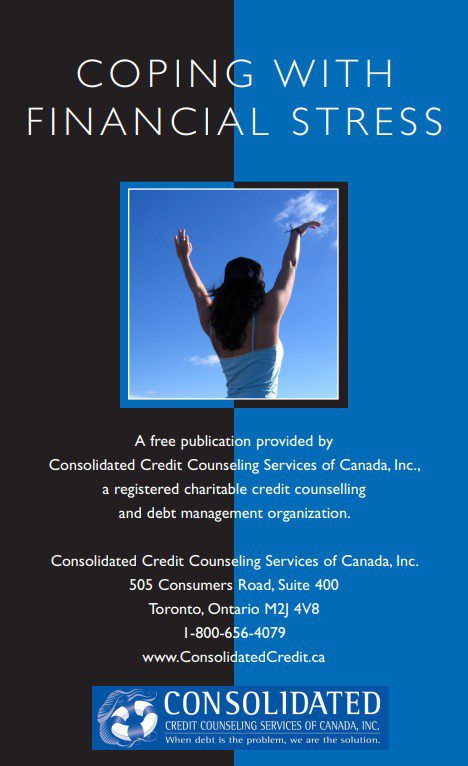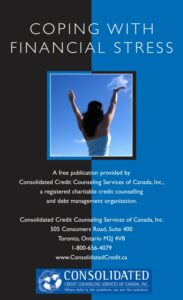
Coping with Financial Stress
If you’re under financial stress, you may be arguing with your spouse or family members about money, experiencing headaches or panic attacks, hiding bills or receipts from family members, or finding it difficult to sleep at night. Your eating habits may have gone south, and you may find it hard to make it through the day. Use this guide to help you deal with your stress.

Congratulations on taking this important step to a brighter financial future. Consolidated Credit Canada has been helping Canadians across the country solve their credit and debt problems for years.
Our Educational Team has created over twenty-five publications to help you improve your personal finances. By logging onto www.consolidatedcreditcanada.ca you can access all of our publications free of charge. We have tools to help you become debt free, use your money wisely, plan for the future, and build wealth. The topics Consolidated Credit Canada addresses range from identity theft to building a better credit rating; from how to buy a home to paying for university. On our website, you will also find interactive tools that allow you to calculate your debt and see how much it is costing you.
We are dedicated to personal financial literacy and providing a debt-free life for Canadians. If you are overburdened by high interest rate credit card debt, then I invite you to speak with one of our trained counsellors free of charge by calling (844)-402-3073 for free professional advice.
Sincerely,
Jeffrey Schwartz
Executive Director
Consolidated Credit Canada.
Coping with Financial Stress
Financial problems can be enormously stressful. According to a survey by Desjardins Financial Security, money is the main source of stress for 44% of participants and it’s keeping people from being healthy.
If you’re under financial stress, you may be arguing with your spouse or family members about money, experiencing headaches or panic attacks, hiding bills or receipts from family members, or finding it difficult to sleep at night. Your eating habits may have become unhealthy, and you may find it hard to make it through the day.
In fact, an Aventis healthcare survey conducted in 2002 showed that 51% of Canadian employees experience a great deal of stress at work. We all know that work is our source of income which is what keeps our household together and running as it should be.
Financial stress can also hurt your ability to do your job well. More than one in five Canadian workers have used an Employee Assistance Program to manage a personal situation (Desjardin Financial Security survey June 1, 2006). When stress is causing a decrease in work performance, it may result in loss of wages, demotions, or one of many other issues.
You may feel like you are the only one in your situation, or you may have tremendous guilt or regret over choices you have made in the past. Now is the time to put the past behind you and start working toward financial freedom. There can be an end to your financial stress and worry but it takes coping, commitment and planning.
Following are strategies you can use to reduce financial stress and get your life back on track.
Step One: Coping
The first step in dealing with financial stress is to try to relieve some of the stress as quickly as you can. This can help you feel better and give you the strength and perspective you need to make changes for your future. Here are some important coping strategies:
See Your Doctor: If you are experiencing physical symptoms such as panic attacks, insomnia, depression, or high blood pressure as a result of your financial problems, see a doctor. It can be very difficult to handle financial pressures when you are not feeling well physically or not getting enough sleep.
Medical help may be what you need to be able to cope with your problems.
Exercise: Regular exercise can help reduce stress. According to the Canadian Mental Health Association, research has found that regular physical activity can be as effective as psychotherapy for treating mild to moderate depression. Aside from the fact that exercise can just make you feel better, it could be just what the doctor ordered. Visit www.cmha.ca.
Get Help: If your financial distress is compounded by abusive or self-destructive behaviour – either in yourself or in loved ones – get help. Those who are abusing alcohol or drugs can find resources through local support groups like Alcoholics Anonymous. There are many resources and support groups available through the Canadian Centre on Substance Abuse as well. Employee assistance programs (EAP) are also available through your employer.
The Canadian Mental Health Association is a great resource for those who feel they may be abused at home or if you feel that your stress is being taken out on those you love.
Deal with Debt Collectors: Debt collectors can be aggressive. If you are receiving calls, communicate with the collector and let them know your situation. Under no circumstances, should they be harassing you. It is much better to try to work with your creditor as much as you can before they are forced to sell your account to a collection agency. Once your account is sold, the creditor notifies the credit bureau that the debt was charged off. If you are able to work something out first with the creditor, you can avoid that negative mark on your credit report.
If you know that you are unable to meet the obligations that your creditor is offering, you are better off contacting a reputable counselling agency early, than letting the account charge off. Working with a counselling agency may reflect on your credit report but it shows that you are making an effort to meet your financial obligations. When you let your accounts go to a collection agency, it reflects that you did not make an effort to fulfill your part of the deal. Once you are working with a credible agency that can make payment arrangements and communicate with your creditors, the calls will stop.
You are protected by both provincial and federal regulations from being harassed and treated unfairly by financial institutions and agencies. If at any time you feel that you are being treated unfairly by a creditor or a collection agency contact your local government or visit www.consumer.ic.gc.ca.
Talk About It: Find someone you can trust – a close friend or relative, clergy or a mental health professional – to share the fears and worries you are experiencing. Finances are a very personal issue but talking about your concerns can help you see your situation objectively and assist you in finding a solution.
Get Real: If you’ve been juggling bills, you may not have a clear picture of where you stand financially. Completing a detailed budget is crucial if you want to change your situation. You’ll find a free budgeting workbook at www.ConsolidatedCreditCanada.ca. Fill it out entirely. Include your spouse or partner in the process. This may seem frightening but don’t put it off. The longer you wait, the worse your situation will likely become.
Be Thankful: When you’re in financial difficulty, you may feel the weight of the world is on your shoulders. But for most people, even when things aren’t going well, there is still a lot they can be thankful for. Oprah Winfrey says that keeping a “gratitude journal” has been helpful for her and many who have followed her advice feel the same. Take the time each day to write down three or four things you are thankful for, and really take a few moments to reflect on what you have written.
In addition to gum disease, bruxism or teeth grinding can be a result of chronic stress. Symptoms of teeth clenching and grinding are headache, jaw pain, and teeth that are worn down or flat. Often this is not diagnosed until side effects
are detected by an individual.
Simplify: In today’s frantic consumer world, it can be hard to step back and simplify. But a simpler life may save you money and help reduce your stress (and improve your overall health). Look at where you are spending your time and money to see if you can identify ways to cut back.
Change What You Can: Lynne Hornyak, PhD, PCC is a coaching consultant on the mental side of money. She recommends you look at things that are causing you financial stress in two ways: their level of importance, and whether they can be changed. Items will fall into one of four categories:
- Important, Changeable: A high mortgage payment may be an example of this. You need a roof over your head so it is important, but you can change this expense by perhaps refinancing or moving to a less expensive home. Frequently bailing your friends or children out of their money problems, when you have your own, is something that also may be important and changeable.
- Important, Not Changeable: Perhaps your financial problems were due to a death in the family or a divorce. There may be nothing you can do to change the facts, but those issues are important. Since you can’t change what happened, you may have to change your attitude, expectations or both. Grieve for your loss, but then shift your focus onto other things you can do to live within your current financial reality. Do not feel that you have to deal with this on your own, either. Talk to someone.
- Not Important, Changeable: The fact that your spouse insists on paying the bills by hand when you would rather do it online may drive you nuts, but it may not be important as long as they are being paid. If it’s not important, change your attitude.
- Not Important, Not Changeable: Maybe your parents always squabbled about money and that bothered you. But that is in the past and how they talked to you then is not really important, nor can you change it. Let it go. Of course, if you are a parent now, how you talk to your kids about money is entirely within your control! Again, if you find that your past is causing a major impact in your daily ability to live your life, talk to someone and get help.
Become Resilient: Resilience is adapting well in the face of difficult events or stress. You may have more resilience than you think, and it can be learned. Both Dalhousie and Queen’s University have conducted studies on the ability for young people to learn resilience and even thrive in a challenging and unsuitable environment. You can find more information regarding the International Resilience Project at www.resilienceproject.org.
Resources:
For more tools and information to help you cope with financial stress:
- The Canadian Mental Health Association offers free education along with numerous resources concerning the mental health of Canadians. For more information, see their website at www.cmha.ca.
- For more information regarding dental health and periodontal disease, visit the Canadian Academy of Periodontology’s website at www.cap-acp.ca.
- Debt Collector Information: For free information on your rights when it comes to debt collectors, visit www.consumer.ic.gc.ca.
- Lynn Horniak’s website at www.lmhservices.com offers free articles and a free self-quiz that helps you understand your relationship to money.
About Consolidated Credit Canada
Consolidated Credit Canada is consumer oriented, non-profit organization. We are an industry leader in providing credit counselling and debt management services. Our mission is to assist individuals and families in ending financial crises and to help them solve money management problems through education, motivation, and professional counselling. Our organization is funded primarily through voluntary contributions from participating creditors. Our programs are designed to save our clients money and liquidate debts at an excellent rate.
We are dedicated to empowering consumers through educational programs that will influence them to refrain from overspending and abusing credit cards,
as well as to encourage them to save and invest. Regardless of whether your financial problems are due to the purchase of a new home, birth of a child, major illness, or any other circumstance, we can help.
* If you are headed for a debt disaster visit www.ConsolidatedCreditCanada.ca or call (844)-402-3073 for free professional advice by a trained counsellor.




